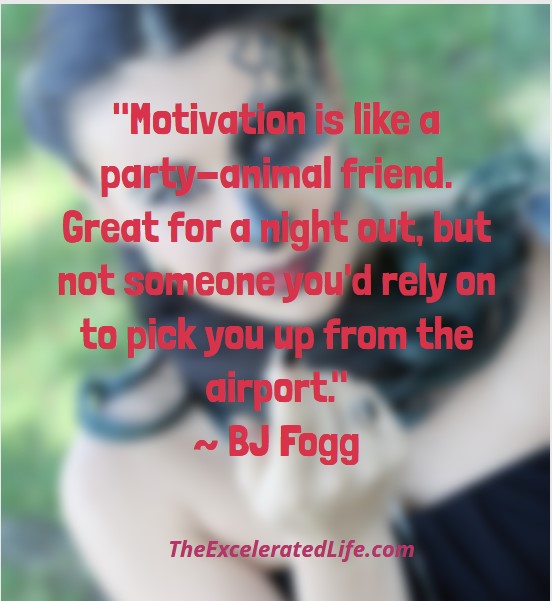Motivation is essential but not sufficient. It is critical to get us started but is not reliable to keep us going. Understanding how motivation and goals work together allows you to tap into the power of motivation.
TheExceleratedLife.com

Lost Dreams
Alexander had a BIG goal. He wanted to run a marathon. The idea was exciting and he was fired up, highly motivated to reach his goal. Alexander had not run much and never competitively. So, he knew he’d need a good plan to make his dream a reality. He talked to friends, read a couple of books, and made a detailed list. He’d need new shoes and proper running clothes. Alexander created an elaborate training schedule, starting slowly and working up to longer and longer runs. By the time he’d finished his master plan, a couple of weeks had elapsed. Somehow, he didn’t feel as excited as he had at the beginning and, when he looked over his list, he felt exhausted just thinking about it. Alexander stuck the plan in his desk drawer and soon forgot about running as he moved on to other things.
Alexandra had a BIG goal, too. She wanted to run a marathon. The idea was exciting and she was fired up, highly motivated to reach her goal. Alexandra had done some shorter races in her younger days, but other interests and responsibilities had taken her away. Alexandra decided she just needed to get started training. She pulled out her old running shoes, laced them on, and headed out. Alexandra ran every day for a week. One mile, then two miles, then four. Then three, then two. By that time, she was so sore she could barely move. Alexandra decided that she needed to recover and heal, then she’d get back to training. But after a couple of days, she had forgotten about running as she moved on to other things.
Motivation and Goals
Both Alexander and Alexandra were highly motivated to reach their goals. In fact, without motivation, nothing could get done. Motivation comes from the Latin word movere, meaning “to move”. Without movement, there is no action. And without action, goals are not reached. Motivation gets us up and moving toward a desired end.
But what happened? When Alexander looked at everything he’d need to do to reach his goal, he became overwhelmed. His motivation flagged. Alexandra jumped in full bore but she tried to do too much too fast. Exhausted, she gave up as her motivation evaporated.
And that’s the problem with motivation. You can’t rely on it.
The Problem with Motivation
Motivation is critical to get us started but is not reliable to keep us going. When we examine motivation, we find a number of causes as to why this happens.
There are motivation waves. [Fogg] Motivation starts high, as it did for Alexander and Alexandra, but hits a peak and then comes crashing down. [Fogg] It ebbs and flows like waves on the ocean; we cannot sustain high levels of motivation. Therefore, we can’t rely on motivation staying high from day-to-day.
In fact, we can’t even rely on motivation staying high from hour to hour. Motivation fluctuates. [Fogg] I have a friend who stocks up on Valentine chocolates on February 15 and buys Easter candy the Monday after Easter. He is motivated to buy by the cut-rate prices.
Store owners know that most people are not motivated to buy holiday candies after the holidays, so they drop the prices to get rid of the inventory. Some people are not motivated to buy holiday goods after the holidays and some people are more motivated to buy them because of the cheaper prices. Different people, different motivations.
And we have to deal with conflicting motivations. I want to get up and work out in the morning, but I need my rest. I want to cut sugar from my diet but, boy, those donuts in the break room sure look good. I like to have popcorn for supper on Sunday nights. Is it because I love popcorn? Or is it because my family used to have popcorn for supper on Sunday nights and I want to get back to that simpler time? We aren’t always aware of the conflicting motivations going on within us.
The Parts of Motivation
Dr. Lyn Kelley, author, speaker, life coach, and trainer identifies three main factors in motivation – values, enjoyment, and empowerment.
Values. Values are principles or qualities we deem as worthy or desirable. We won’t be motivated by things we don’t value. We don’t all have the same basic values. Each of us values some qualities over others, and so we are motivated by different motivating factors.
Enjoyment. You are motivated by things you enjoy. Some of these things can be good for you and some of them can be bad for you. See Conflicting Motivations above.
Empowerment. Activities, situations, and desires that make you feel strong and confident, safe and secure are empowering. These are motivating. Empowerment brings validation from you and your world that you are doing something worthwhile.
In addition to the three factors of motivation, BJ Fogg has identified the three sources of motivation, PAC. PAC stands for the Person, the Action, and the Context.
The person = yourself; you are motivated by what you want. The action = a benefit or punishment tied to the action itself. And the context = your environment and surroundings, including your community of friends. [Fogg]
How to Use Motivation
Motivation is essential to get you moving toward a desired change or in the direction of your chosen goal, but it is likely not enough to get you all the way. So you must manage your motivation. Take advantage of it, but don’t depend on it.
Consider your sources of motivation, the three factors: you, the benefit (or punishment) you’ll receive, and the context.
When considering motivation and goals, it’s important to differentiate between aspirations, outcomes, and behaviors [Fogg]
Aspirations are abstract desires, for example, to run a marathon.
Outcomes are measurable results you want to achieve, such as to compete in the Cooper Bridge 10-K Run on September –, 20–.
And a behavior is an action you can take at a specific time, say run 1 mile today.
Outcomes are what we typically think of as goals but behaviors are how we reach the goal/outcome. Your motivation to reach the goal has to transform to motivation to perform the behavior.
When you consider the benefit or punishment of an action, ask yourself if you are more motivated by alleviating pain or in pursuing pleasure? Dr. Kelley advises using this question: “What does my work mean to me?” If it provides the money you need to have a great lifestyle, you are probably more motivated by seeking pleasure. But if you see working as a means to keep from being broke and unable to pay your bills, you are probably more motivated by avoiding pain. It’s an important distinction and may help you to devise a more effective strategy to overcome obstacles.
Finally, when you consider behaviors, motivation, and goals, look at the context, your environment. Set it up when you are highly motivated so it encourages “correct” behavior when you are not so motivated. For example, if you are motivated to change to a healthier way of eating, get rid of the junk food in your house. When your motivation flags, it’s harder to binge on junk food when there isn’t any readily available.
Or take advantage of Shawn Achor’s “twenty-second rule“. Set up your environment to make the behavior you want to perform easier to do. If you want to replace TV watching with reading, move the remote to an inconvenient place and put your book where it’s easier to reach. Achor determined that a 20-second delay is all that is necessary to replace the undesired behavior; that is, if it takes 20 seconds more to retrieve the remote, you’ll mostly opt to reach for the book that’s in front of you.
And remember: Motivation toward an abstract behavior doesn’t work [Fogg] Michelle Segar reports in her book, No Sweat, that people who exercise to receive an immediate beneficial result (such as to feel better now) exercise more and more regularly than those who exercise for a more abstract reason (to lose weight). [Segar]
Motivation +
We see then that the key to matching motivation and goals is to tap into the power of motivation when motivation is high but don’t rely on it to keep the behavior going.
When we fail to perform a behavior we want to do or to do more of, we typically focus on motivation. We blame our failure on a lack of self-control or a lack of willpower. But the key to motivation is don’t start with motivation. Analyze your attempts to change a behavior by following these steps in this order [Fogg]:
Start with the prompt. Is there a clear and unambiguous one? As Fogg says, “No prompt, no behavior.”
Then, evaluate your ability to perform the behavior. Is it easy to do? How could you make it easier?
Finally, are you motivated to do the behavior? Recall the 3 areas of motivation: Person – Action – Context, or environment. [Fogg] Consider each area.
Person: Does it really matter to you? Could you make it more important?
Action: Is there a built-in reward for doing the behavior or punishment for not doing it?
Context: Can you arrange your environment to move you toward the desired behavior?
Decide what you want then determine why you want it. Make the outcome concrete, not abstract.
Motivation + is not relying on motivation alone.
Tapping the Power of Motivation
Motivation is essential but not sufficient. When you understand this and understand that motivation is fickle, you have the tools to change and improve.
Use these ideas to strengthen motivation and to tap into its power. Let this be the springboard that propels you toward your goals. That is embracing the Excelerated Life™!
Excelerated Goal Setting™ — planning and achieving BIG (Bold, Important, Gratifying) goals — is one step in creating your Excelerated Life™, a life of flourishing and well-being, and a life of meaning, purpose, and service.
Read more about the Excelerated Life™.
Resources:
Achor, Shawn. The Happiness Advantage. New York: Crown Publishing Group, 2010.
Fogg, Ph.D., BJ. Tiny Habits: The Small Changes That Change Everything. New York: Houghton Mifflin Harcourt Publishing Company, 2020.
Segar, Ph.D., Michelle. No Sweat: How The Simple Science Of Motivation Can Bring You A Lifetime Of Fitness. New York: AMACOM, 2015.



One Reply to “I Want To Reach My Goal . . . Don’t I?”